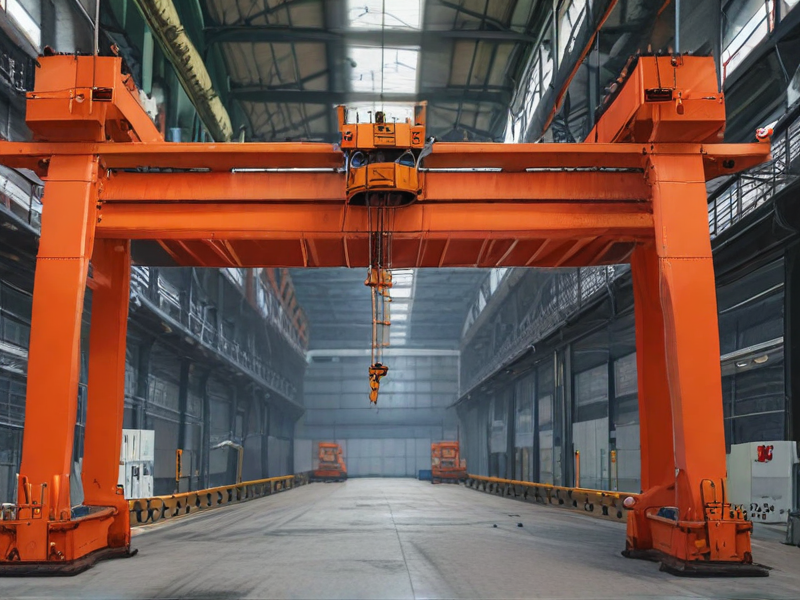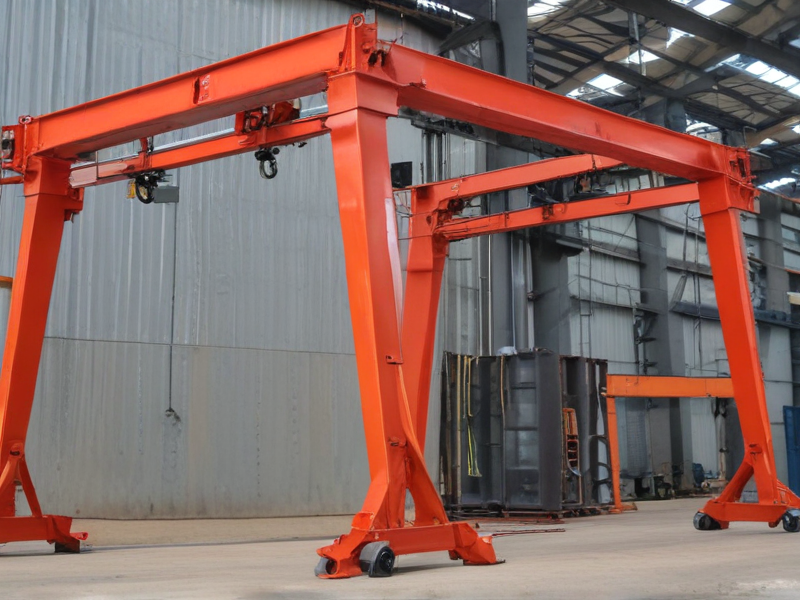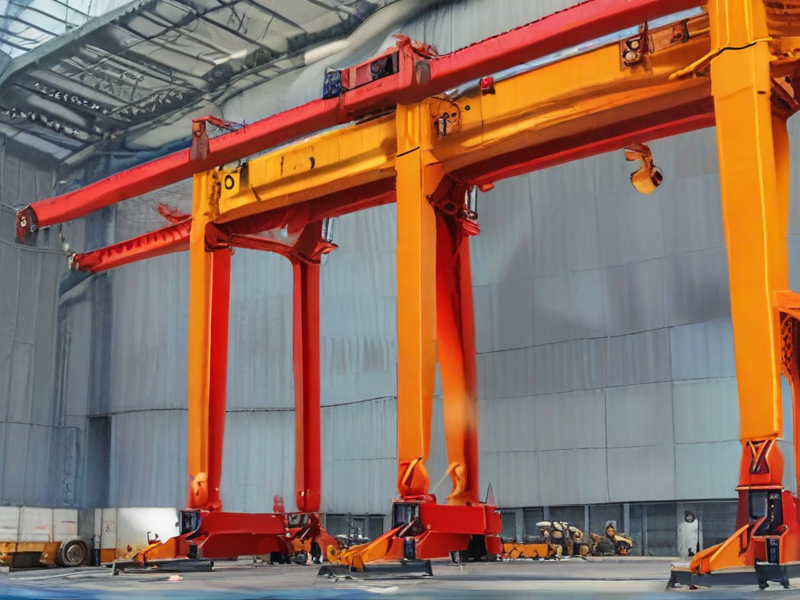An In-Depth Analysis of Manufacturing Expenses for 2 ton gantry crane cost
Manufacturing expenses for a 2-ton gantry crane are influenced by various factors, including raw materials, labor, overhead, and associated costs. A detailed breakdown helps in understanding these expenses comprehensively.
Raw Materials (40-50% of Total Cost):
Steel is the primary raw material, constituting the crane’s structural components. Market prices for steel fluctuate, impacting overall costs. Other materials include fasteners, wheels, and electrical components for motorized versions.
Labor Costs (15-25%):
Skilled labor is required for welding, assembly, and quality control. Labor rates vary by region, but generally, experienced technicians and welders command premium wages.
Overhead Costs (10-15%):
Overhead encompasses utility bills, rent for manufacturing facilities, and salaries for non-production staff. Larger firms tend to have higher overheads due to extensive infrastructures.
Machinery and Equipment Depreciation (5-10%):
Investment in machinery essential for manufacturing—such as welding machines, CNC machines, and hoists—depreciates over time. Depreciation costs are factored into the manufacturing expenses.
Design and Engineering (5-10%):
Designing a 2-ton gantry crane involves engineering calculations to ensure safety and efficiency. Costs include salaries for engineers and the use of specialized software.
Quality Control and Testing (3-5%):
Ensuring the crane meets industry standards through rigorous testing adds to the cost. Destructive and non-destructive testing methods are deployed to verify material integrity and functionality.
Logistics and Transportation (2-4%):
Transporting raw materials to the manufacturing site and the finished product to clients incurs substantial costs, particularly if the destination is remote.
Regulatory Compliance and Certifications (2-3%):
Adhering to safety standards and obtaining necessary certifications, such as ISO or OSHA, incurs additional expenses but are crucial for market acceptance.
In conclusion, the manufacturing cost of a 2-ton gantry crane is a composite of various factors, with raw materials and labor contributing the largest shares. Efficient management of these elements ensures competitive pricing in the market.

Understanding the Components that Contribute to the Price of 2 ton gantry crane cost
The cost of a 2-ton gantry crane is influenced by several key components:
1. Material: The type of material used, such as steel or aluminum, directly impacts the crane’s price. Steel is typically more robust and cheaper, while aluminum offers advantages in weight but can be more expensive.
2. Design and Customization: Customized gantry cranes designed to meet specific operational requirements often cost more due to unique engineering and design efforts. Standard, off-the-shelf models tend to be less expensive.
3. Capacity and Dimensions: Higher lifting capacities and larger dimensions usually increase the price. A crane with additional features such as height adjustability or extended spans will also see an uptick in cost.
4. Mobility Options: Gantry cranes can be stationary, portable, or mobile with wheels or rails. Mobile options typically cost more due to the added components and complexity.
5. Components and Features: Advanced features like motorized hoists, wireless controls, variable speed drives, and enhanced safety mechanisms contribute significantly to the overall cost. Basic models with manual hoists and less automation are cheaper.
6. Brand and Manufacturer: Reputable brands and established manufacturers often come with a premium due to their track record, reliability, and service guarantees. Emerging or lesser-known brands might offer lower prices but with varying quality and after-sales support.
7. Compliance and Certification: Ensuring compliance with local and international safety and manufacturing standards can add to the cost, but it’s essential for operating legally and safely.
8. Installation and Delivery: Costs of shipping, assembling, and installing the crane at the worksite are significant factors. Complex installations requiring professional services further increase the total expense.
9. Maintenance and Warranty: Longer warranties and options that include maintenance packages often come at a higher initial purchase price but may offer cost savings over the crane’s lifecycle.
Each of these elements contributes to the final cost of a 2-ton gantry crane, making it essential to evaluate the specific needs and budget constraints of the business before making a purchase.
Comparing the Wholesale and Retail Prices of 2 ton gantry crane cost in China
The cost of a 2-ton gantry crane in China varies significantly between wholesale and retail markets. Wholesale prices are typically aimed at bulk buyers, including resellers and large industrial clients. Retail prices, on the other hand, target end-users such as small businesses and individual customers.
Wholesale Prices
Wholesale prices for a 2-ton gantry crane in China generally range between $2000 to $4000, depending on the specifications, manufacturer, and order quantity. These prices benefit from economies of scale, as manufacturers can reduce costs due to bulk purchasing of materials and streamlined production processes. Moreover, wholesalers often have established relationships with suppliers, which can lead to further discounts. Freight costs might also see reductions when multiple units are shipped together.
Retail Prices
Retail prices are usually higher to account for additional costs such as marketing, warehousing, individual shipping, and after-sales services. A 2-ton gantry crane in the retail market in China typically falls between $3000 to $6000. Retailers also invest in providing warranties, installation, and customer support, which contribute to the elevated prices. These services enhance customer satisfaction but pose an added expense for the retailer, which is then passed on to the consumer.
Quality and Customization
Both wholesale and retail prices can be influenced by factors like build quality, material used (e.g., steel grades), and specific customizations (e.g., motor efficiency, control systems). Premium manufacturers with stringent quality controls generally charge higher prices, irrespective of the market type.
Conclusion
In summary, while wholesale prices for a 2-ton gantry crane in China hover around $2000 to $4000 due to bulk purchasing advantages, retail prices range from $3000 to $6000, reflecting additional consumer-centric services and lower order volumes. Buyers should weigh their needs, such as bulk purchasing potential and after-sales support requirements, to choose the appropriate market.

Understanding Shipping and Logistics for 2 ton gantry crane cost from China
Shipping and logistics for a 2-ton gantry crane from China involve several key steps, which you’ll need to manage carefully to ensure that the process is cost-effective and efficient.
1. Supplier Selection
– Research and Compare: Identify multiple reliable suppliers. Verify their credentials, and assess product quality and pricing.
– Negotiation: Discuss terms, including payment conditions, shipping methods, and Incoterms (most commonly FOB or CIF).
2. Quotation and Pricing
– Quotation Request: Obtain detailed quotes that include the cost of the gantry crane, packaging, and any additional services.
– Analysis: Compare the total costs, factoring in shipping and potential tariffs.
3. Shipping Arrangements
– Freight Forwarder: Engage a reputable freight forwarder to handle logistics. They’ll manage bookings, documentation, and coordination.
– Shipping Mode: Choose between sea freight (most common for heavy machinery) or air freight (faster but more expensive).
4. Documentation
– Essential Documents: Ensure the commercial invoice, packing list, bill of lading, and certificate of origin are prepared accurately.
– Customs Clearance: Verify that all documents comply with both Chinese export and your country’s import regulations.
5. Packaging and Loading
– Protection: Ensure the gantry crane is adequately packed (crate or container) to prevent damage.
– Loading Supervision: Oversee the loading process, optionally, to confirm proper handling.
6. Shipping and Transit
– Tracking: Monitor the shipment through tracking systems provided by the forwarder or shipping line.
– Insurance: Insure the shipment for loss or damage during transit.
7. Delivery and Installation
– Customs Clearance: Coordinate with customs brokers in your country for smooth clearance.
– Delivery: Arrange local transportation from the port to your site.
– Setup: Plan for off-loading and installation, ensuring appropriate equipment and personnel are available.
Cost Factors
– Product Cost: Varies based on specification and customization.
– Shipping Cost: Influenced by weight/volume, shipping route, and mode (sea or air).
– Import Duties and Taxes: Subject to your country’s regulations and tariff classification.
Managing these aspects can help streamline the process and control costs, ensuring the safe and timely arrival of your 2-ton gantry crane.
Potential Tariffs or Import Taxes on 2 ton gantry crane cost Purchased from China
Importing a 2-ton gantry crane from China involves several potential costs beyond the purchase price, including tariffs and import taxes that can significantly impact the total expense. Below is an overview of the factors to consider, staying within a 300-word limit.
1. Harmonized System Code (HS Code):
– Identify the correct HS Code for gantry cranes, which typically falls under headings like 8426 (Ships’ derricks; cranes, including cable cranes; mobile lifting frames, straddle carriers and works trucks fitted with a crane).
– Accurate classification is crucial as it determines the applicable tariff rates.
2. Customs Duty:
– The U.S. International Trade Commission (USITC) and Harmonized Tariff Schedule (HTS) websites provide the specific duty rates for various types of machinery.
– For example, a standard duty rate might be around 2.4%, but it can vary based on the crane’s specific features and classifications.
3. Section 301 Tariffs:
– Since 2018, additional tariffs under Section 301 have been applied to many Chinese imports, including industrial machinery.
– These tariffs can add up to 25% on top of the regular customs duty, significantly increasing the cost.
4. Value-Added Tax (VAT):
– When the crane is imported for business use, a Value-Added Tax could also apply. This varies by country and region.
5. Other Fees:
– Harbor Maintenance Fee (HMF): Applied to imports arriving by vessel, typically at a rate of 0.125% of the cargo’s value.
– Merchandise Processing Fee (MPF): Usually ranges from $26.79 to $528.33 depending on the value of the imported goods.
6. Exemptions or Reductions:
– Certain trade agreements or duty drawback programs may offer exemptions or reductions in tariffs. Researching eligibility for such programs is advisable.
In summary, the combined impact of customs duty, Section 301 tariffs, and additional fees can significantly raise the cost of importing a 2-ton gantry crane from China. Consulting with a customs broker or trade specialist can help navigate these complexities and optimize costs.

Impact of Market Demand and Competitive Environment on 2 ton gantry crane cost
Market demand and the competitive environment significantly impact the cost of a 2-ton gantry crane. When market demand for gantry cranes is high—driven by increased industrial activities, construction projects, or infrastructural developments—prices tend to rise due to the classic economic principle of supply and demand. Manufacturers may face pressures to scale up production, which can lead to higher material and labor costs that are eventually passed on to consumers. Conversely, during times of reduced demand, prices may drop as manufacturers compete to maintain market share, sometimes even offering discounts or enhanced features at lower prices.
The competitive environment plays a critical role as well. In a market saturated with multiple manufacturers, competition forces companies to innovate and optimize their production processes to reduce costs and offer more value to consumers. This often results in more competitive pricing. Companies might also differentiate their products through features like advanced technology, improved efficiency, or superior durability, impacting pricing strategies. In contrast, in a market dominated by a few key players, limited competition can lead to higher prices, as fewer alternatives are available to consumers.
Moreover, global factors such as tariff regulations, raw material availability, and international trade policies also influence costs. For example, tariffs on imported steel can significantly increase material costs for crane manufacturers, subsequently driving up retail prices.
Ultimately, the cost of a 2-ton gantry crane is a dynamic figure, influenced by the interplay of market demand and competitive forces, along with external economic factors. Buyers should carefully consider these aspects and potentially time their purchases strategically to take advantage of favorable market conditions.
FAQ about 2 ton gantry crane cost with Multiple Answers
FAQ about 2 Ton Gantry Crane Cost
Q1: What is the average cost of a 2 ton gantry crane?
Answer 1: The cost of a 2 ton gantry crane can vary significantly based on the type, features, and supplier. On average, you can expect to pay anywhere from $2,000 to $10,000.
Q2: What factors influence the cost of a 2 ton gantry crane?
Answer 2: Several factors influence the cost, including:
– Material: Steel vs. aluminum can affect price.
– Customization: Special features or custom sizes may increase costs.
– Brand and Manufacturer: Reputable brands may come with higher price tags.
– Type: Portable vs. fixed gantry cranes can differ in price.
– Accessories/Add-ons: Such as trolleys, hoists, and safety features.
Q3: Are there additional costs beyond the initial purchase price?
Answer 3: Yes, additional costs can include:
– Shipping and Handling: Especially for larger, heavier models.
– Installation Fees: Professional setup can add to your total cost.
– Maintenance: Regular maintenance to ensure longevity and safety.
– Training: Operator training can also add to costs.
Q4: Can I save money by buying a used 2 ton gantry crane?
Answer 4: Purchasing a used crane can be more cost-effective upfront; however, consider potential hidden costs like maintenance, repairs, or the shorter lifespan of the equipment.
Q5: Is financing available for purchasing a 2 ton gantry crane?
Answer 5: Many suppliers offer financing options to help manage the cost. This can include installment payment plans or leasing options.
Q6: Does the cost include a warranty?
Answer 6: It varies by manufacturer and supplier. Always check the warranty details to understand what is covered and for how long. Some suppliers include a limited warranty, while others may offer extended warranties at an additional cost.
Q7: How do I find the best deal on a 2 ton gantry crane?
Answer 7: To find the best deal:
– Compare Quotes: Get multiple quotes from different suppliers.
– Check Reviews: Look for reviews or testimonials.
– Consider Total Cost of Ownership: Include initial cost, maintenance, and operational expenses.
In summary, the cost of a 2 ton gantry crane can vary, and it’s important to consider all factors and potential additional expenses when making a purchasing decision.

